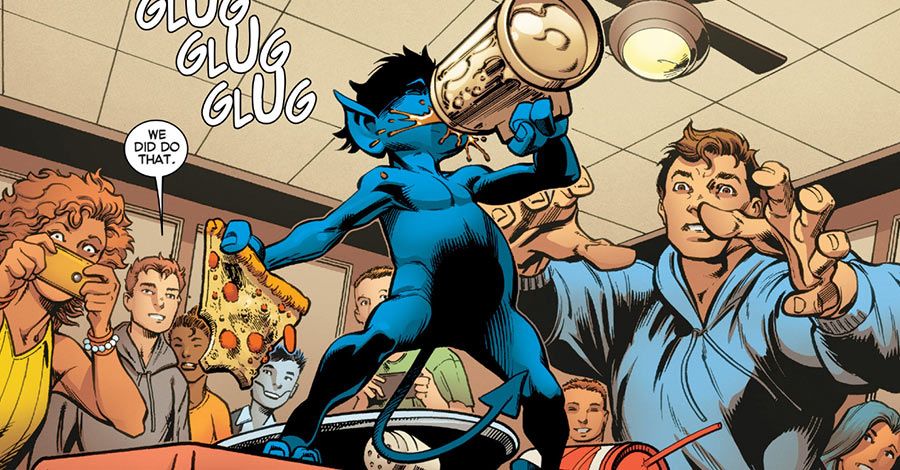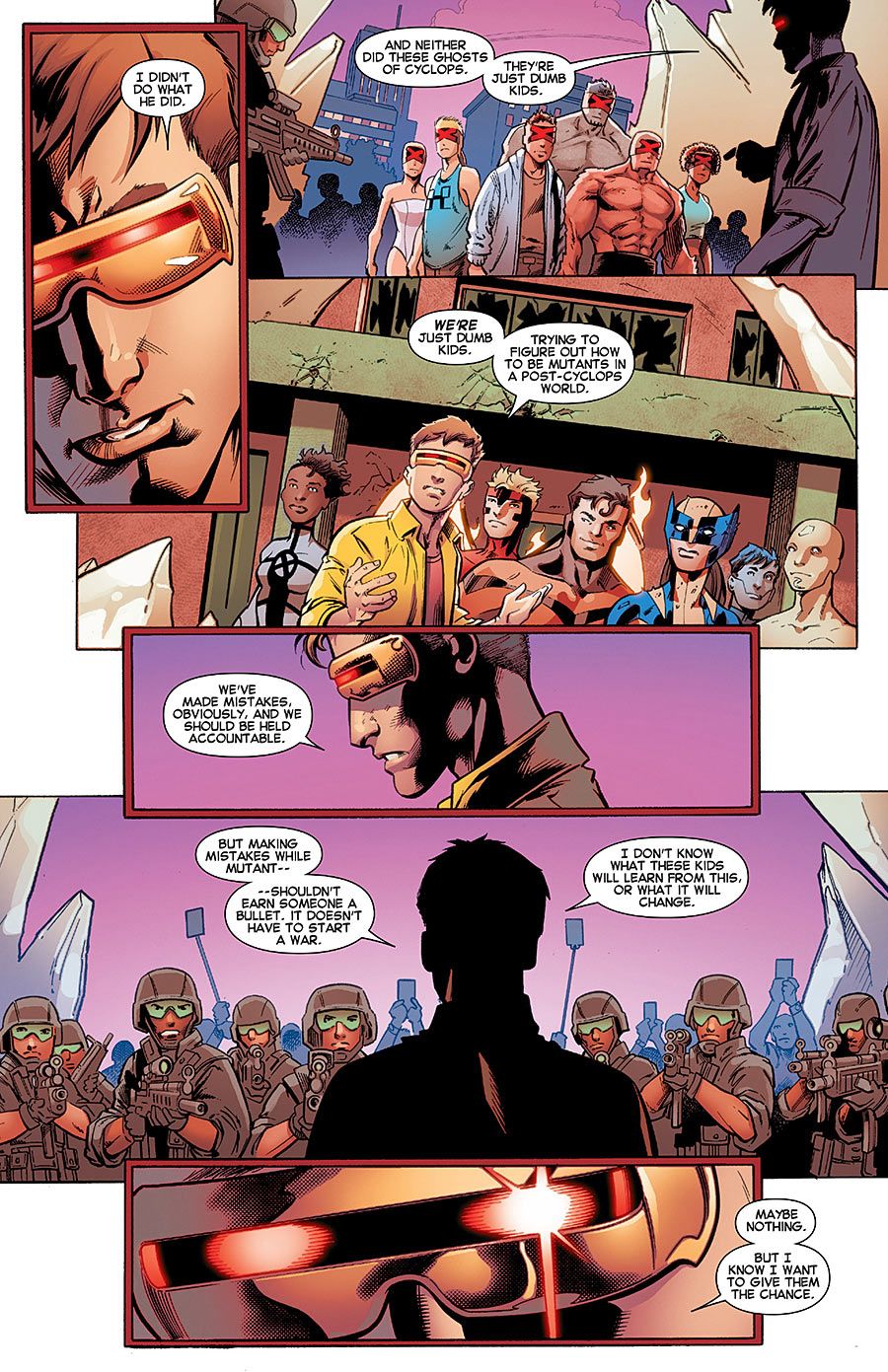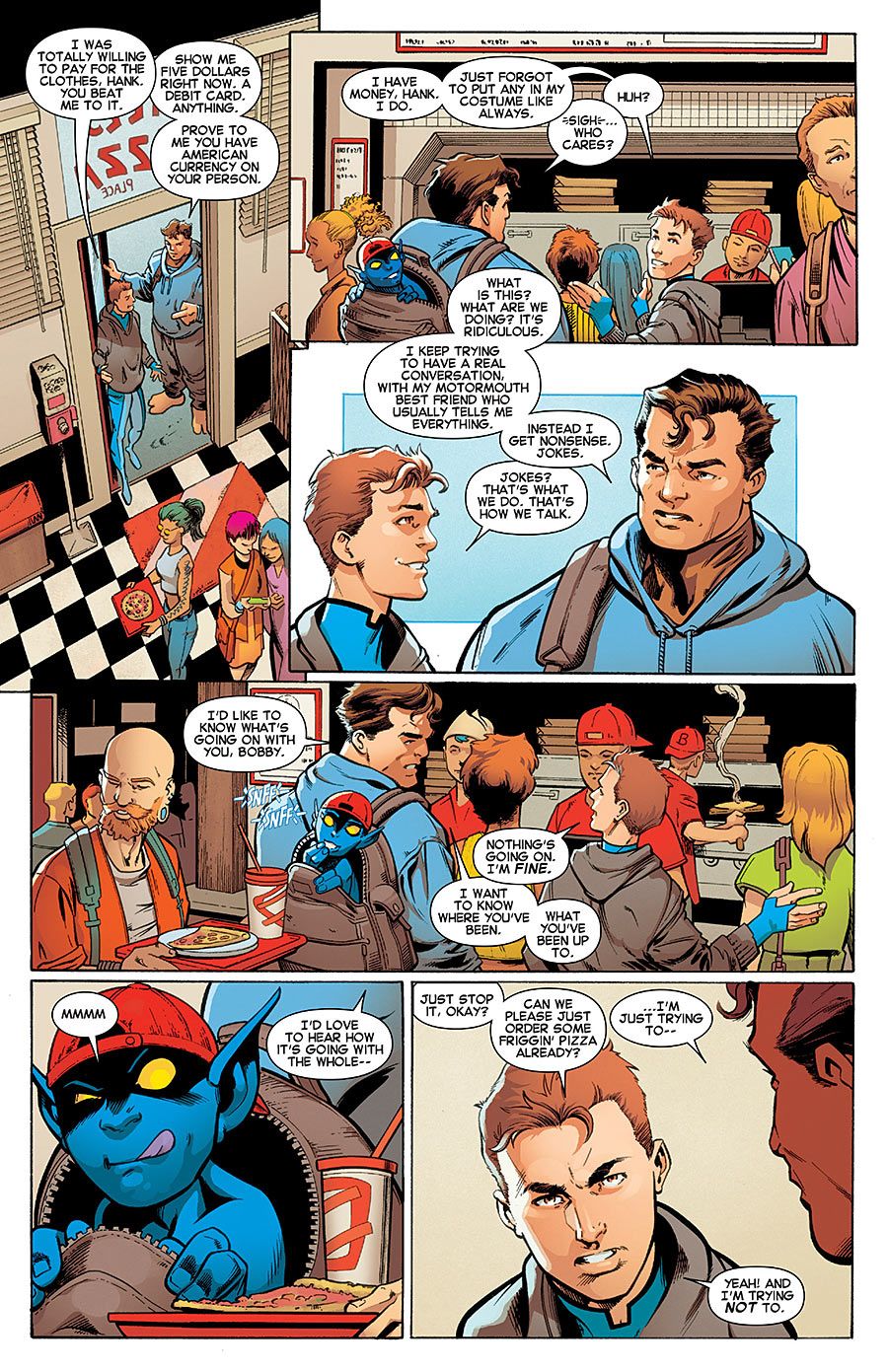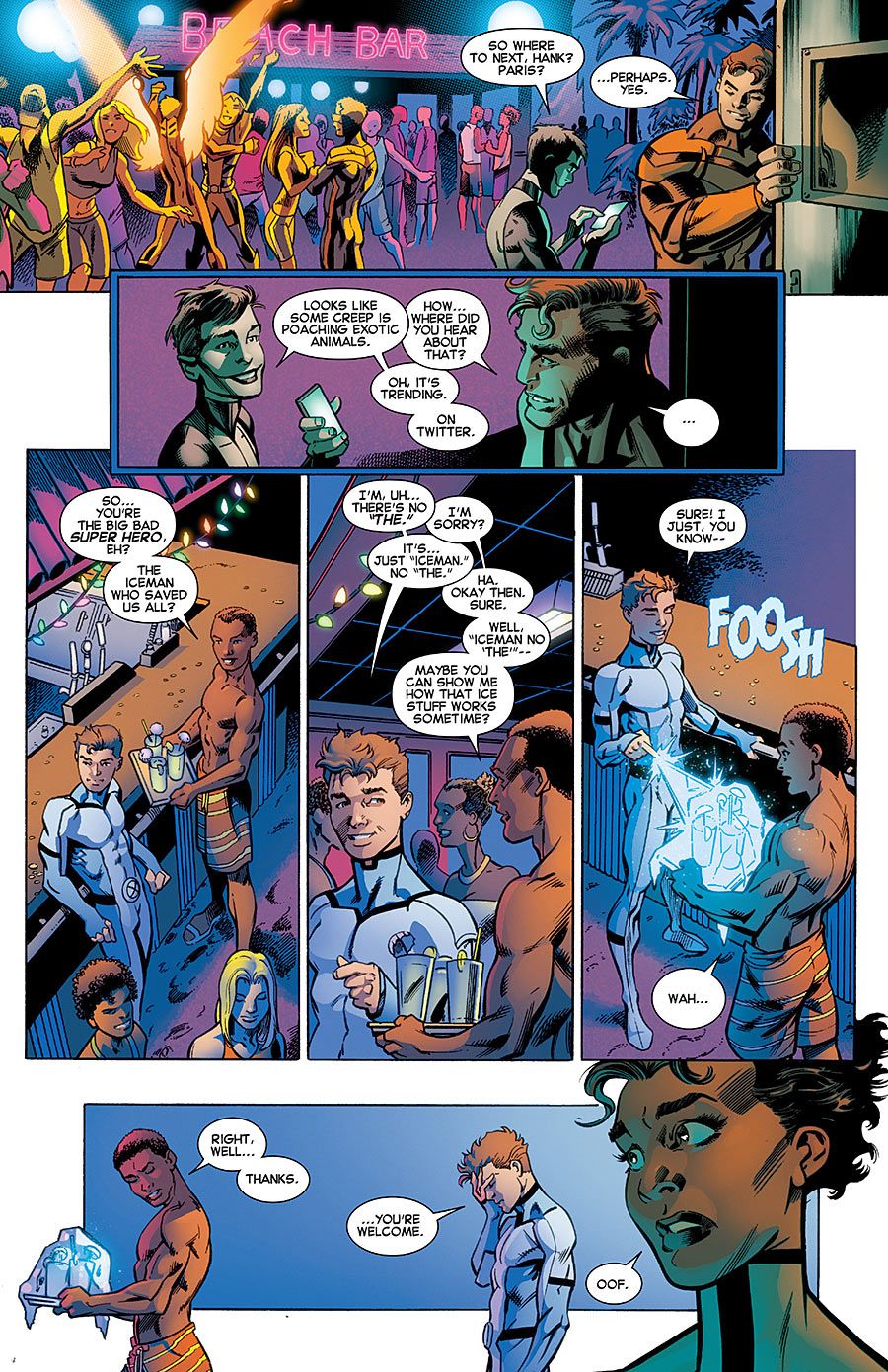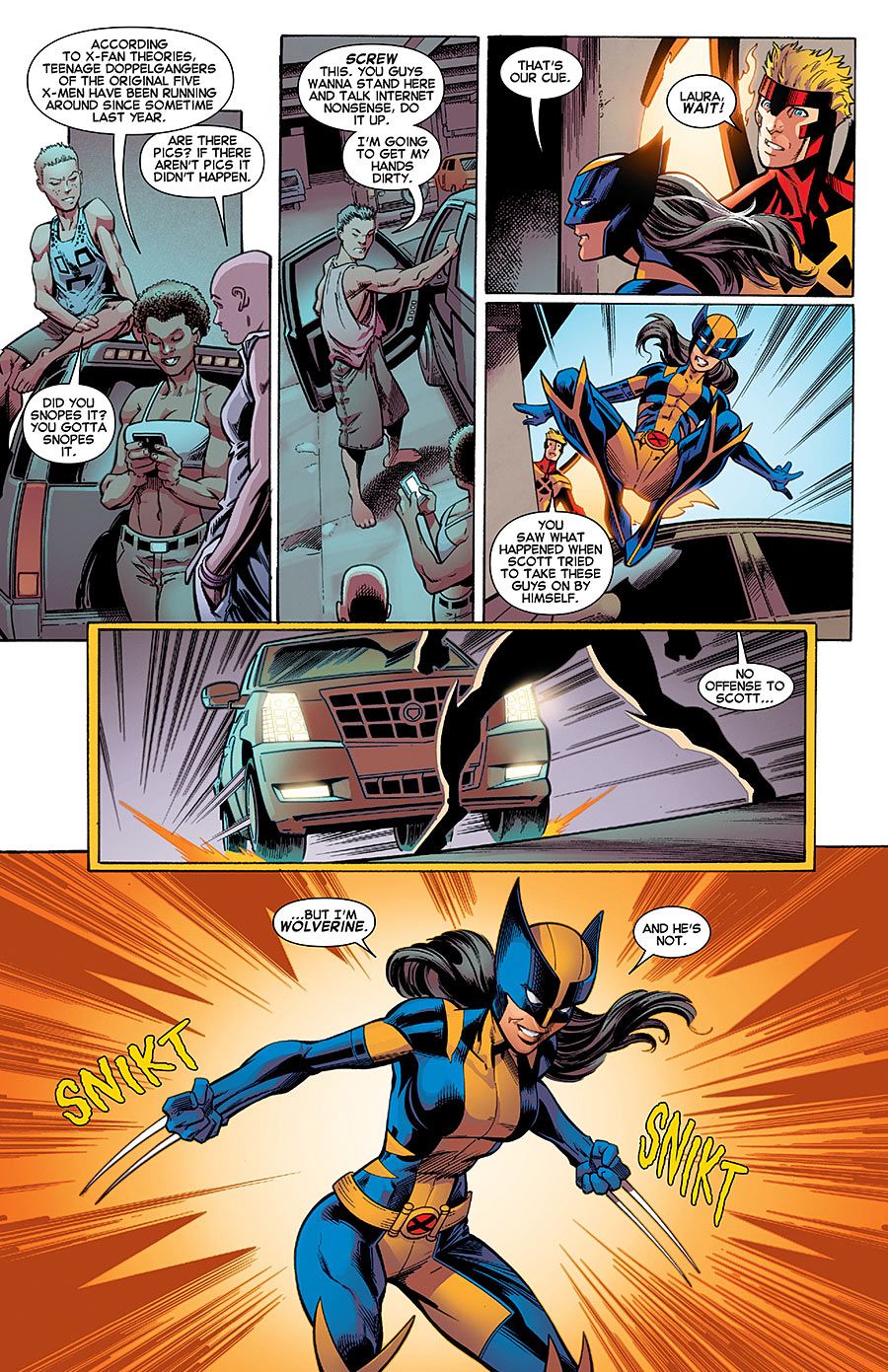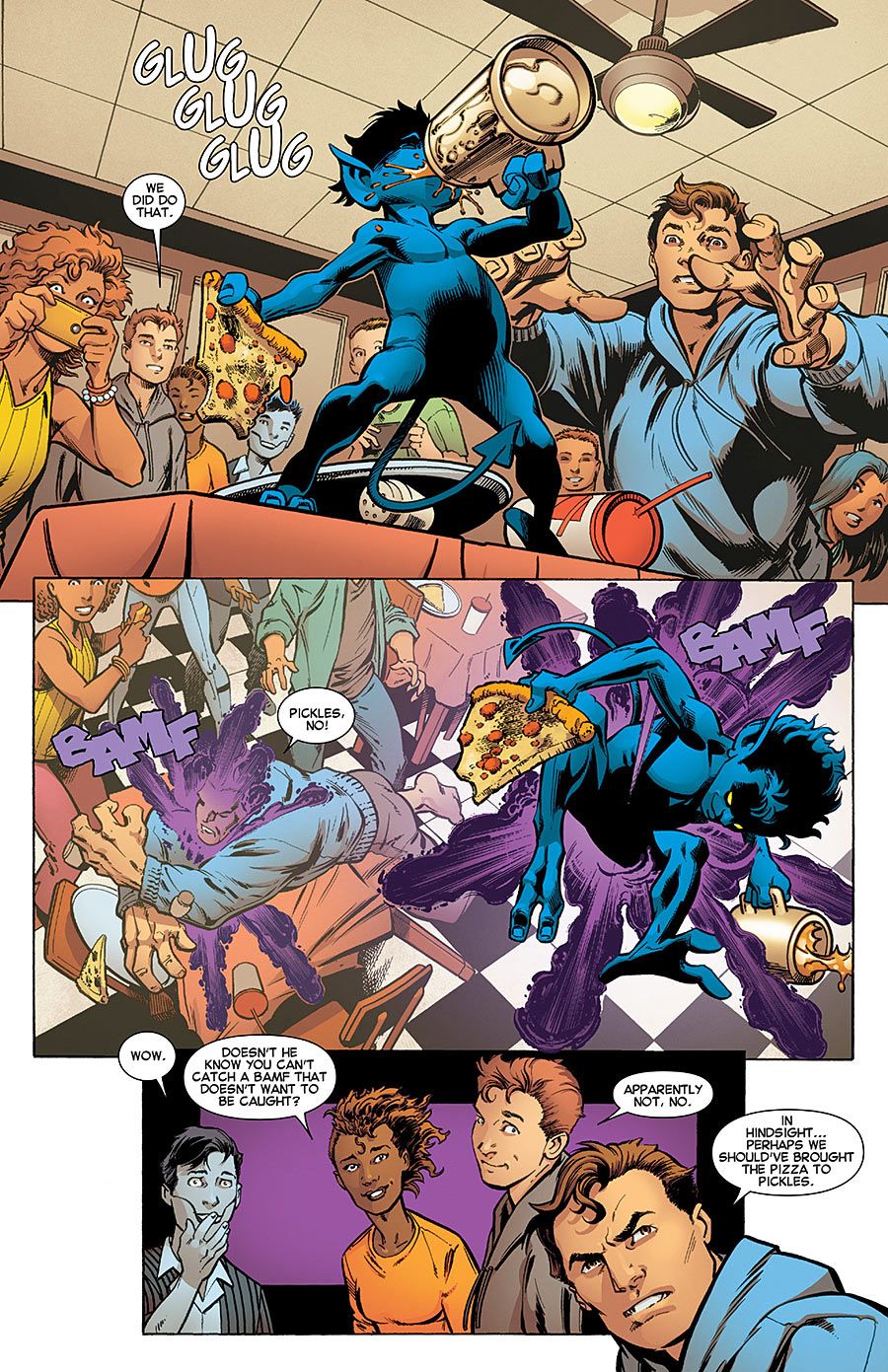Things are not looking so good for the X-Men -- and I don't mean that in a conspiracy theory way, either. In fact, between the X-Men books getting a movie tie-in and the rest of the Marvel Universe getting variant covers to match, things feel way less doom-and-gloom IRL than they do in the comics.
In the comics, the X-Men (and just generally mutants) have their backs/wings/capes up against a wall again; the Terrigen Mist is destroying the mutant race, the remnants of the Jean Grey School now reside in hellish Limbo, the Dark Riders are posing a serious threat for the first time ever, Nightcrawler has lost his mind, Josh Foley died again and Monet is flirting with Sabretooth! Things are bad -- which also means, as far as I'm concerned, they're good.
I do like what Jeff Lemire and Humberto Ramos are doing in "Extraordinary X-Men" and, yep, I also like Cullen Bunn and Greg Land's "Uncanny X-Men." The X-Men line is smaller than it's been in decades, a fact that I previously would have guzzled like panic fuel, but it also feels more manageable. For the first time in a long time, I feel like I have a grasp on what the X-Men team books are doing right now because, well, there are only three of them and they're all making big moves. Big dark moves that have me worried about for the fates of all involved -- especially Colossus and his beard. Should I do a whole column about the beard?
But (enjoyable) doom and gloom of "Extraordinary" and "Uncanny" aside, there's the third team book -- "All-New X-Men." This book isn't getting nominated in the drama categories of the fictional X-Men awards show that I dreamed up for the purposes of this metaphor. It's fun, and it's fun in a way that very few X-Men books I've read have been in a while. The teen team book from writer Dennis Hopeless and artist Mark Bagley is fun without being a slapstick comedy, it's fun while tackling heavy character stuff, and it's fun even if a lot of the actual characters in the book are not having a totally great time. This series is all about teenage angst, fate versus free will and dealing with the crappy hand dealt to you by previous generations (or in this case, your modern-day adult counterpart) -- and I have a blast with it every month.
Forget time travel and space fights and tortured romance, teenage angst is really what the X-Men really do best. Because the original X-Men graduated so early in the original 1960s run and the more successful '70s iteration starred adults, people often forget that this was a teenage book at first. Those '60s issues are filled with hormonal headaches that have nothing to do with mutant powers. The franchise remembered its roots in the early '80s with the launch of a spinoff series, "New Mutants," that starred teens. Since then, every generation of X-Men fans have had a corresponding batch of mutants to bond with (mine was "Generation X"). "All-New X-Men," which was originally started by Brian Michael Bendis and Stuart Immonen in 2012, is the latest in a very long line of teen X-books -- and, in a way, it's also a continuation of the very first teen X-book, 1963's "X-Men."
If you're still reading this and aren't familiar with the premise of "All-New X-Men," first let me applaud your perseverance through my many X-specifics. Second, strap yourself in for this X-planation. The book stars the original X-Men -- yeah, the original X-Men, as in "they were pulled forward in time from the past" X-Men. In a way, the past few years of this book have extended the original X-Men's teenage years, which were initially sped through so that they could reach a nebulous and generic young adult age. Now we're getting to spend a lot more time with teenage Cyclops, Beast, Angel and Iceman (teen Jean's over with the adults in "Extraordinary X-Men"). It turns out that those four are just as angsty as all the teenage mutants fans have enjoyed in the past few decades -- yes, even as angsty as the wonderful Jubilee.
If all that sounds confusing then, well, it's actually business as usual when it comes to the X-Men. But also, Dennis Hopeless doesn't let the premise of the book be confusing. While the book doesn't really address the million paradoxes that pop up because of the nature of time travel, and I know that there are fans that really want those questions answered ASAP, I like that the book treats these time-displaced teens as characters first and players in a time stream conundrum never. They're from the past, they're here now, and they can comprehend Twitter once you show them the ropes. I appreciate that the complex scientific minutiae is left out in favor of character work. Time travel isn't real but the emotions that humans experience sure are.
Like the "New Mutants"/"New X-Men" volumes of yore, this book is chock full of character stuff. Teen Cyclops has had to live down the fact that he shares a face (albeit less hardened and stubble-y) with an extremely polarizing mutant figure. Archangel learned that his adult self goes through massive personal and physical upheavals on a regular basis, so he went through his own cosmic metamorphosis in order to give a cosmic middle finger to fate. Considering the problematic acts his adult self has perpetrated, teen Beast's deal is similar to Cyclops -- except for the "sharing a face thing." But Beast's still loved (teen Jean) and lost (remember how she's not in "All-New X-Men"?).
And then there's Iceman. I've written about what Iceman's story means to me. The thing is, I think many audience members can see their stories in what Hopeless is doing with Angel and Cyclops, as each of their fights against the fate adults have laid out for them. I think others can relate to the self-destructive streak that Laura Kinney, the team's resident Wolverine, is going through as depicted in "All-New X-Men" #4. And while we haven't seen much of teen Iceman's coming out process, what we have seen rings true for me. In an earlier issue, we saw Beast -- Iceman's best friend -- reach out and try to talk, really talk with his buddy. Iceman brushed off the offer, preferring to joke around instead.
I know that feeling; for deeply closeted people, coming out involves a lot of mental reorganization as you try to identify what you really see when you look in a mirror. When I came out to myself in college, I had to do a lot of looking in a mirror and saying the words, to my reflection, "I am gay." Those words felt alien to me, and it took a while for me to get my own perception of myself matched up with what I finally realized to be the truth. Of course Bobby doesn't want to talk about this to Hank, his best friend; Bobby's still coming to terms with who he is, so how can he talk about it? I feel you, teen Iceman.
And then there's a scene in "ANXM" #4 wherein Bobby's a total doofus klutz around a guy that's hitting on him. And no, I'm not going to go into the more embarrassing things I said/did during my first year dating men in this column. Nope!
Iceman's my way in, but, as I listed up above, there are so many fascinating character arcs playing out simultaneously -- all while the team teleports around the world in a TARDIS-like Volkswagen Bus (it's bigger on the inside) saving all the lives they can in an effort to improve mutant/human relations! Come on, that's a fun premise! The X-Men books have been mired in schisms and extinctions for a very long time, so seeing a team go back to basic superheroics brings a smile to my face. It's also fitting that it's the teen team pulling this move; these kids might have a lot of personal drama going on, but they're still idealistic and have enough youthful bravado to eschew the missions their adult counterparts believe in to do their own thing.
The book also wouldn't be as much fun without the art team of Mark Bagley, Andrew Hennessy and Nolan Woodard. With a record-breaking 100-plus issue run of "Ultimate Spider-Man" on his legendary resume, Bagley's the guy you go to when you want excellent, emotive teen superhero fare. Yes, there are artists that do cutting-edge teenage style, but Bagley delivers consistently and repeatedly when it comes to action, emotion and storytelling. Iceman's awkward body language, Wolverine's dangerous confidence, Angel's worry -- it's all right there on the page, without the need for dialogue to call it out. I've been reading Mark Bagley comics since I was in middle school, and I feel confident saying that this is career-best stuff.
There's plenty of dark stuff going on in the world of the X-Men right now -- and it's good stuff, too. But I'm glad that there's a book like "All-New X-Men" in the line as well, counterbalancing the other books by being its own unique brand of fun. This is the kind of comic that teenage me would have drawn fan art for, no doubt, and it's the kind of comic that adult me really enjoys escaping into.
And if all that didn't win you over, know that this book includes a rambunctious mini-Nightcrawler named Pickles that loves pizza and hates clothes. You want to get in on this.
Brett White is a writer and comedian living in New York City. He made videos for the Upright Citizens Brigade as a member of UCB1 and writes for the podcast Left Handed Radio. His opinions can be consumed in bite-sized morsels on Twitter (@brettwhite).

